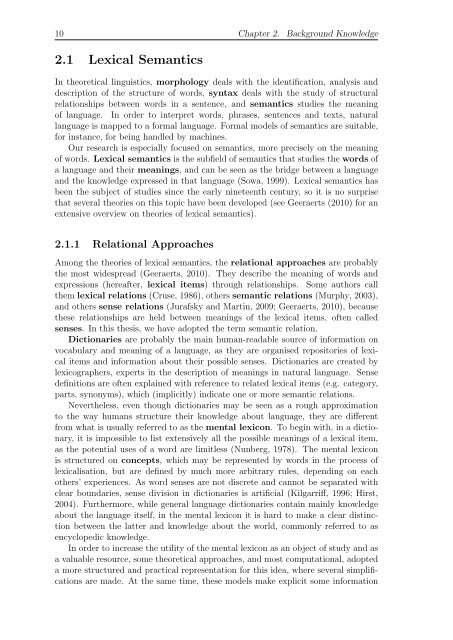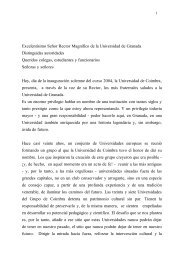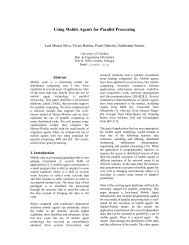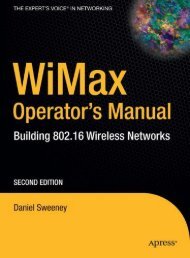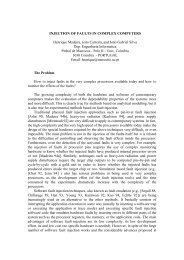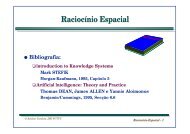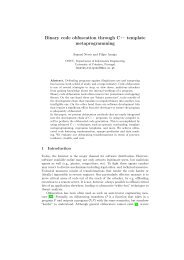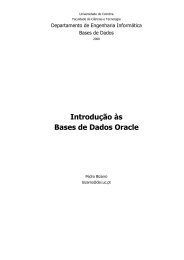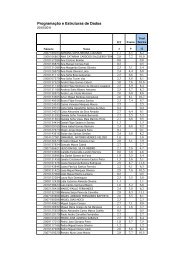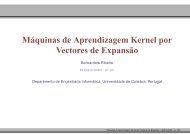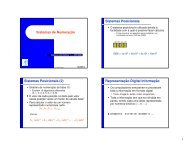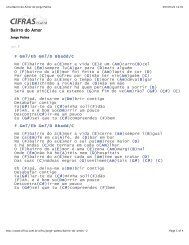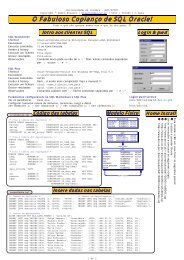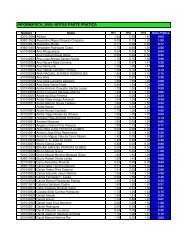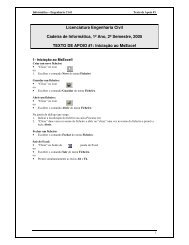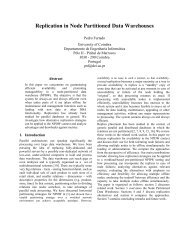Onto.PT: Towards the Automatic Construction of a Lexical Ontology ...
Onto.PT: Towards the Automatic Construction of a Lexical Ontology ...
Onto.PT: Towards the Automatic Construction of a Lexical Ontology ...
You also want an ePaper? Increase the reach of your titles
YUMPU automatically turns print PDFs into web optimized ePapers that Google loves.
10 Chapter 2. Background Knowledge<br />
2.1 <strong>Lexical</strong> Semantics<br />
In <strong>the</strong>oretical linguistics, morphology deals with <strong>the</strong> identification, analysis and<br />
description <strong>of</strong> <strong>the</strong> structure <strong>of</strong> words, syntax deals with <strong>the</strong> study <strong>of</strong> structural<br />
relationships between words in a sentence, and semantics studies <strong>the</strong> meaning<br />
<strong>of</strong> language. In order to interpret words, phrases, sentences and texts, natural<br />
language is mapped to a formal language. Formal models <strong>of</strong> semantics are suitable,<br />
for instance, for being handled by machines.<br />
Our research is especially focused on semantics, more precisely on <strong>the</strong> meaning<br />
<strong>of</strong> words. <strong>Lexical</strong> semantics is <strong>the</strong> subfield <strong>of</strong> semantics that studies <strong>the</strong> words <strong>of</strong><br />
a language and <strong>the</strong>ir meanings, and can be seen as <strong>the</strong> bridge between a language<br />
and <strong>the</strong> knowledge expressed in that language (Sowa, 1999). <strong>Lexical</strong> semantics has<br />
been <strong>the</strong> subject <strong>of</strong> studies since <strong>the</strong> early nineteenth century, so it is no surprise<br />
that several <strong>the</strong>ories on this topic have been developed (see Geeraerts (2010) for an<br />
extensive overview on <strong>the</strong>ories <strong>of</strong> lexical semantics).<br />
2.1.1 Relational Approaches<br />
Among <strong>the</strong> <strong>the</strong>ories <strong>of</strong> lexical semantics, <strong>the</strong> relational approaches are probably<br />
<strong>the</strong> most widespread (Geeraerts, 2010). They describe <strong>the</strong> meaning <strong>of</strong> words and<br />
expressions (hereafter, lexical items) through relationships. Some authors call<br />
<strong>the</strong>m lexical relations (Cruse, 1986), o<strong>the</strong>rs semantic relations (Murphy, 2003),<br />
and o<strong>the</strong>rs sense relations (Jurafsky and Martin, 2009; Geeraerts, 2010), because<br />
<strong>the</strong>se relationships are held between meanings <strong>of</strong> <strong>the</strong> lexical items, <strong>of</strong>ten called<br />
senses. In this <strong>the</strong>sis, we have adopted <strong>the</strong> term semantic relation.<br />
Dictionaries are probably <strong>the</strong> main human-readable source <strong>of</strong> information on<br />
vocabulary and meaning <strong>of</strong> a language, as <strong>the</strong>y are organised repositories <strong>of</strong> lexical<br />
items and information about <strong>the</strong>ir possible senses. Dictionaries are created by<br />
lexicographers, experts in <strong>the</strong> description <strong>of</strong> meanings in natural language. Sense<br />
definitions are <strong>of</strong>ten explained with reference to related lexical items (e.g. category,<br />
parts, synonyms), which (implicitly) indicate one or more semantic relations.<br />
Never<strong>the</strong>less, even though dictionaries may be seen as a rough approximation<br />
to <strong>the</strong> way humans structure <strong>the</strong>ir knowledge about language, <strong>the</strong>y are different<br />
from what is usually referred to as <strong>the</strong> mental lexicon. To begin with, in a dictionary,<br />
it is impossible to list extensively all <strong>the</strong> possible meanings <strong>of</strong> a lexical item,<br />
as <strong>the</strong> potential uses <strong>of</strong> a word are limitless (Nunberg, 1978). The mental lexicon<br />
is structured on concepts, which may be represented by words in <strong>the</strong> process <strong>of</strong><br />
lexicalisation, but are defined by much more arbitrary rules, depending on each<br />
o<strong>the</strong>rs’ experiences. As word senses are not discrete and cannot be separated with<br />
clear boundaries, sense division in dictionaries is artificial (Kilgarriff, 1996; Hirst,<br />
2004). Fur<strong>the</strong>rmore, while general language dictionaries contain mainly knowledge<br />
about <strong>the</strong> language itself, in <strong>the</strong> mental lexicon it is hard to make a clear distinction<br />
between <strong>the</strong> latter and knowledge about <strong>the</strong> world, commonly referred to as<br />
encyclopedic knowledge.<br />
In order to increase <strong>the</strong> utility <strong>of</strong> <strong>the</strong> mental lexicon as an object <strong>of</strong> study and as<br />
a valuable resource, some <strong>the</strong>oretical approaches, and most computational, adopted<br />
a more structured and practical representation for this idea, where several simplifications<br />
are made. At <strong>the</strong> same time, <strong>the</strong>se models make explicit some information


